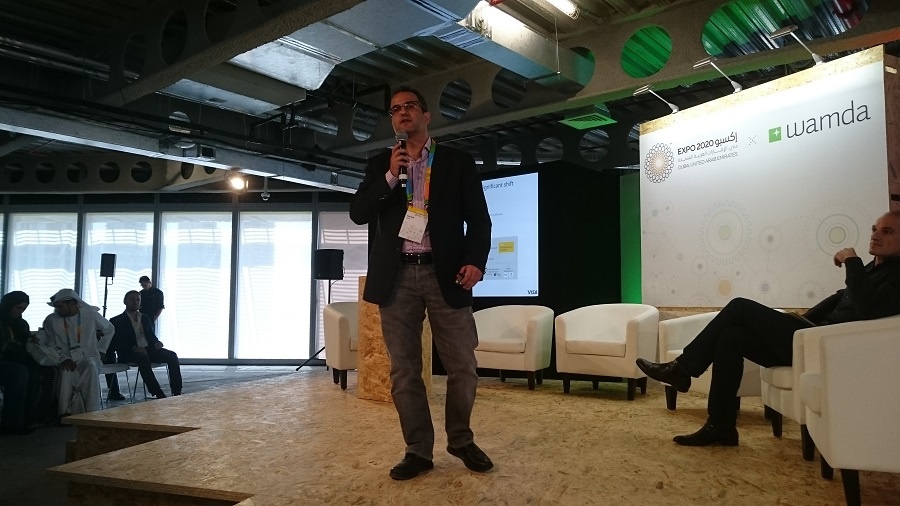What I know about making people pay: Hadi Raad

Fintech is the hot sector of 2016: banks are jumping into it, the Nasdaq is testing ideas, Abu Dhabi is setting up a fintech ‘regulatory sandbox’ and startups are forcing MENA banks to start catering to customers, or die.
In MENA, Visa’s regional head of emerging products and innovation Hadi Raad is particularly interested in the very specific aspect of payments (as well as being a big believer in mobile as a driver of digital financial technology).
He gave both mobile and open APIs a nod as fintech game changers in this region. The latter allows startups to build on larger corporations’ technology, whilst the former lets them deliver a product via consumers’ preferred internet-enabled device.

Collaborative Entrepreneurship Summit in May.
(Image via Wamda)
Those same startups are pushing financial institutions to start thinking about how to improve their current offerings.
Two examples are Dopay in Egypt, working to bring the unbanked into the formal system, and Finerd in the UAE as the region’s first robo-investor, an online investment platform that automatically allocates a user’s capital according to their risk appetite.
All of this is encouraging local financial institutions to consider partnering with local startups, rather than buying them out. This follows a trend in the US where, in the first quarter of 2016, one in four fintech funding deals involved a corporate investor, according to VC deal database CB Insights.
Raad said MENA was rapidly catching up with foreign ideas and payments methods, because these were a common pain point for both rich and poor. As a result, this was a very promising sector.
MENA banks know they have to partner up to survive. Many of our client banks are really active in terms of introducing new digital products. [But] they need to learn how to be more agile. That’s always a challenge with large corporations and startups which are very fast, so it’s about how fast can the banks move to keep the pace.
Payments are a priority for partnerships. Bridg is one example here in the UAE where we’ve been doing some work around Visa development platforms. Trolley.ae, although not a fintech startup, is using the Visa API and checkout for their payments pages. [And] this year we announced the Visa developers platform, which basically opens up the company’s API to developers all over the world.
Payments are where the money is. If you look at mobile payments some statistics suggest that [globally] mobile traffic grew four to five times in the last year. The same thing is happening in terms of payments, growth in mobile payments is much higher than anything else. Making that transaction smoother with less friction is a key part of any application, be it a fintech or an ecommerce startup.
Consumers will force change. Consumers today want digital and they want it for mobile banking and payments products. Consumers on average pick up their mobile 150 times a day. They do that for information, entertainment, health matters, anything. So why not also for their financial activities? If banks don’t move, consumers will be pushing them to do so or turning to other products and services.
Banks have to choose. Banks themselves could introduce financial technology or they could partner with startups who have lots of interesting ideas. [They have] lots of assets to leverage and when they partner with fintechs they can give a lot to the consumers. In Russia, for example, a social network worked with a bank to let people send money to a friend. The bank cooperated and partnered to create a new financial product for their customers.
Shoddy payments processes are a problem that affects everyone. We mentioned Bridg earlier, and what they are trying to solve is cash on delivery. And it’s not only Bridg trying to solve the everyday pain of the consumer. Fighting cash is a mission we at Visa are also working on and [it’s an issue] that doesn’t just address a certain segment of the population - it’s for everybody.
MENA isn’t lagging in fintech. There is an overall lag in the region but that’s natural. The region is catching up very quickly. Similar to how the whole financial technology industry is now witnessing a boom, and we’re seeing lots of startups globally, we’re also seeing the same in the MENA region.
Fintech will be local, and global. Sometimes fintech products will stay national because they rely on domestic financial regulations. Something that we launch in the UAE may not work in Saudi Arabia. It might be replicated as a product but it has to go through another country’s regulatory process to before it can become regional or global.


